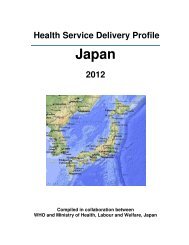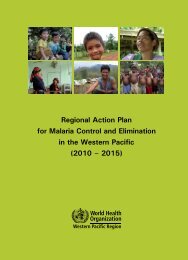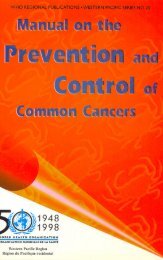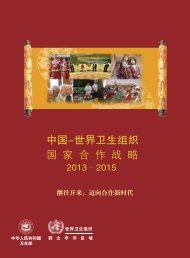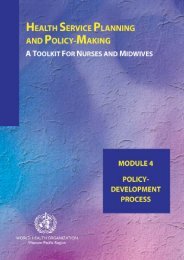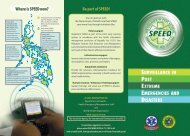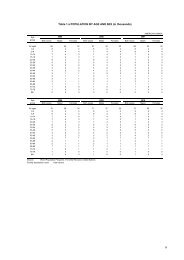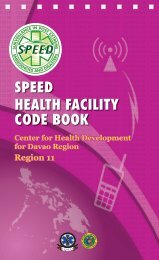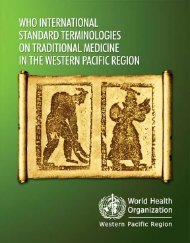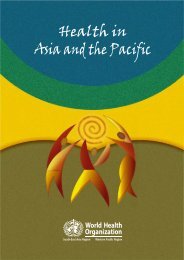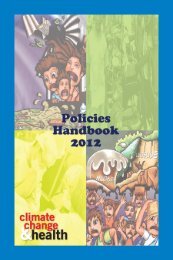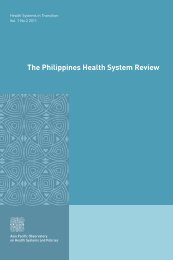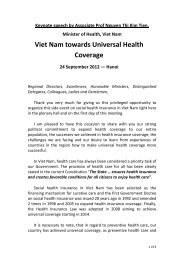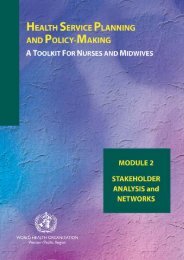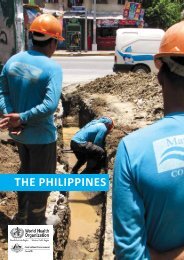monitoring of the who global code of practice on the international ...
monitoring of the who global code of practice on the international ...
monitoring of the who global code of practice on the international ...
Create successful ePaper yourself
Turn your PDF publications into a flip-book with our unique Google optimized e-Paper software.
CONCLUSION<br />
The present report c<strong>on</strong>stitutes <str<strong>on</strong>g>the</str<strong>on</strong>g> Philippines’ additi<strong>on</strong>al c<strong>on</strong>tributi<strong>on</strong> to <str<strong>on</strong>g>the</str<strong>on</strong>g> <str<strong>on</strong>g>m<strong>on</strong>itoring</str<strong>on</strong>g> <str<strong>on</strong>g>of</str<strong>on</strong>g><br />
<str<strong>on</strong>g>the</str<strong>on</strong>g> WHO Global Code <str<strong>on</strong>g>of</str<strong>on</strong>g> Practice <strong>on</strong> <str<strong>on</strong>g>the</str<strong>on</strong>g> Internati<strong>on</strong>al Recruitment <str<strong>on</strong>g>of</str<strong>on</strong>g> Health Pers<strong>on</strong>nel. The<br />
Department <str<strong>on</strong>g>of</str<strong>on</strong>g> Health (DOH) <str<strong>on</strong>g>of</str<strong>on</strong>g> <str<strong>on</strong>g>the</str<strong>on</strong>g> Philippines, being <str<strong>on</strong>g>the</str<strong>on</strong>g> designated nati<strong>on</strong>al authority to<br />
oversee <str<strong>on</strong>g>the</str<strong>on</strong>g> implementati<strong>on</strong> <str<strong>on</strong>g>of</str<strong>on</strong>g> <str<strong>on</strong>g>the</str<strong>on</strong>g> Code, accepted in March 2012 <str<strong>on</strong>g>the</str<strong>on</strong>g> proposal <str<strong>on</strong>g>of</str<strong>on</strong>g> <str<strong>on</strong>g>the</str<strong>on</strong>g><br />
Internati<strong>on</strong>al Labour Organizati<strong>on</strong> to set up a participatory assessment process to collect<br />
data, instead <str<strong>on</strong>g>of</str<strong>on</strong>g> having DOH single-‐handedly collecting data, to include in <str<strong>on</strong>g>the</str<strong>on</strong>g> WHO Nati<strong>on</strong>al<br />
Reporting Instrument. Under <str<strong>on</strong>g>the</str<strong>on</strong>g> organizing leadership <str<strong>on</strong>g>of</str<strong>on</strong>g> <str<strong>on</strong>g>the</str<strong>on</strong>g> DOH, DOLE, <str<strong>on</strong>g>the</str<strong>on</strong>g> ILO and WHO<br />
fed a process which through various preliminary meetings and two multistakeholder<br />
assessment meetings yielded <str<strong>on</strong>g>the</str<strong>on</strong>g> informati<strong>on</strong> that became <str<strong>on</strong>g>the</str<strong>on</strong>g> basis for <str<strong>on</strong>g>the</str<strong>on</strong>g> <strong>on</strong>-‐line<br />
Philippines Nati<strong>on</strong>al Reporting Instrument (submitted <strong>on</strong> 31 May 2012) and this<br />
supplementary, more thorough report.<br />
Five stakeholders group were identified as relevant to <str<strong>on</strong>g>the</str<strong>on</strong>g> exercise: government, trade uni<strong>on</strong><br />
and employers’ organizati<strong>on</strong>s, recruitment agencies and pr<str<strong>on</strong>g>of</str<strong>on</strong>g>essi<strong>on</strong>al organizati<strong>on</strong>s.<br />
As a way to c<strong>on</strong>clude this report, below are some <str<strong>on</strong>g>of</str<strong>on</strong>g> <str<strong>on</strong>g>the</str<strong>on</strong>g> main points that were extracted<br />
from <str<strong>on</strong>g>the</str<strong>on</strong>g> meetings with stakeholders and that <str<strong>on</strong>g>the</str<strong>on</strong>g> organizing committee would like to<br />
submit to <str<strong>on</strong>g>the</str<strong>on</strong>g> WHO’s attenti<strong>on</strong>.<br />
1. The <str<strong>on</strong>g>m<strong>on</strong>itoring</str<strong>on</strong>g> instrument should be differentiated for sending and receiving<br />
countries, respectively. The questi<strong>on</strong>s need to be applicable to resp<strong>on</strong>dents from<br />
sending and receiving countries.<br />
2. The WHO <str<strong>on</strong>g>m<strong>on</strong>itoring</str<strong>on</strong>g> instrument can include o<str<strong>on</strong>g>the</str<strong>on</strong>g>r elements to track<br />
implementati<strong>on</strong> <str<strong>on</strong>g>of</str<strong>on</strong>g> <str<strong>on</strong>g>the</str<strong>on</strong>g> bilateral and multilateral agreements/arrangements such as<br />
<str<strong>on</strong>g>the</str<strong>on</strong>g> following: training, working c<strong>on</strong>diti<strong>on</strong>s, grievance mechanism, skill recogniti<strong>on</strong>,<br />
and resp<strong>on</strong>sibilities <str<strong>on</strong>g>of</str<strong>on</strong>g> recruitment agencies. They raised <str<strong>on</strong>g>the</str<strong>on</strong>g> importance <str<strong>on</strong>g>of</str<strong>on</strong>g> <str<strong>on</strong>g>the</str<strong>on</strong>g><br />
agreement/arrangement beingwritten in <str<strong>on</strong>g>the</str<strong>on</strong>g> language that workers can understand<br />
and that can be m<strong>on</strong>itored.There is still a need to set up a database <str<strong>on</strong>g>of</str<strong>on</strong>g> Philippine<br />
laws and policies relevant to <str<strong>on</strong>g>the</str<strong>on</strong>g> WHO Code<br />
3. Ensuring <str<strong>on</strong>g>the</str<strong>on</strong>g> circulati<strong>on</strong> <str<strong>on</strong>g>of</str<strong>on</strong>g> informati<strong>on</strong> about <str<strong>on</strong>g>the</str<strong>on</strong>g> Code should be a priority. The<br />
Code should be disseminated not <strong>on</strong>ly to government instituti<strong>on</strong>s but to by all<br />
stakeholders, including recruitment agencies and migrant health workers in all<br />
countries through multi media, <str<strong>on</strong>g>the</str<strong>on</strong>g> You Tube, comics, with <str<strong>on</strong>g>the</str<strong>on</strong>g> use <str<strong>on</strong>g>of</str<strong>on</strong>g> local language<br />
and in <str<strong>on</strong>g>the</str<strong>on</strong>g> perspective <str<strong>on</strong>g>of</str<strong>on</strong>g> <str<strong>on</strong>g>the</str<strong>on</strong>g> migrant workers.<br />
4. A feedback mechanism should be made available (even by web) for all stakeholders<br />
to determine <str<strong>on</strong>g>who</str<strong>on</strong>g> are practicing <str<strong>on</strong>g>the</str<strong>on</strong>g> Code and<str<strong>on</strong>g>who</str<strong>on</strong>g> are in need <str<strong>on</strong>g>of</str<strong>on</strong>g> informati<strong>on</strong>. A<br />
formal feedback mechanism is also suggested to obtain informati<strong>on</strong> from <str<strong>on</strong>g>the</str<strong>on</strong>g> health<br />
pr<str<strong>on</strong>g>of</str<strong>on</strong>g>essi<strong>on</strong>als <str<strong>on</strong>g>who</str<strong>on</strong>g> undergo <str<strong>on</strong>g>the</str<strong>on</strong>g> recruitment process. For CHED to include <str<strong>on</strong>g>the</str<strong>on</strong>g> Code<br />
into <str<strong>on</strong>g>the</str<strong>on</strong>g> curriculum <str<strong>on</strong>g>of</str<strong>on</strong>g> <str<strong>on</strong>g>the</str<strong>on</strong>g> health pr<str<strong>on</strong>g>of</str<strong>on</strong>g>essi<strong>on</strong>s and <str<strong>on</strong>g>the</str<strong>on</strong>g> PRC to include this into <str<strong>on</strong>g>the</str<strong>on</strong>g><br />
licensure examinati<strong>on</strong>s<br />
5. In terms <str<strong>on</strong>g>of</str<strong>on</strong>g> collaborati<strong>on</strong> for effective <str<strong>on</strong>g>m<strong>on</strong>itoring</str<strong>on</strong>g>, <str<strong>on</strong>g>the</str<strong>on</strong>g>re should be a str<strong>on</strong>ger<br />
tandem between countries’ departments <str<strong>on</strong>g>of</str<strong>on</strong>g> health and labor to ensure <str<strong>on</strong>g>the</str<strong>on</strong>g><br />
implementati<strong>on</strong> <str<strong>on</strong>g>of</str<strong>on</strong>g> The Code. An example <str<strong>on</strong>g>of</str<strong>on</strong>g> collaborati<strong>on</strong> may be d<strong>on</strong>e through<br />
informati<strong>on</strong> disseminati<strong>on</strong> using DOH, DOLE and o<str<strong>on</strong>g>the</str<strong>on</strong>g>r relevant government<br />
21



